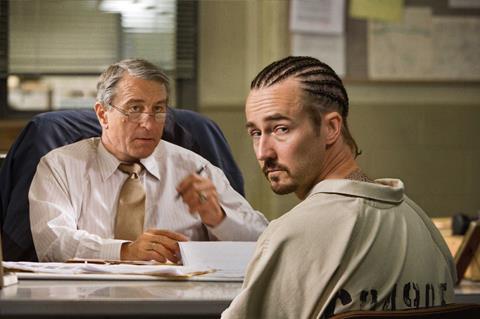Dir: John Curran: US. 2010. 105mins

Thick with moral ambiguity – too thick, unfortunately – Stone proves to be a character drama that confuses heavy brow-furrowing for an insightful dissection of several ethically slippery individuals. Top-lined by Robert De Niro and Edward Norton as, respectively, a parole officer and an incarcerated arsonist, Stone takes its cues from its brooding stars, but it’s impossible to fully lose oneself in the performances once the narrative surrenders to the filmmakers’ heavy-handed examinations of guilt, redemption and the need for spiritual transcendence.
The film’s subtle take on a familiar tale of infidelity may lack the clear emotional payoffs that viewers might be expecting.
Overture, which acquired US rights last year, plans on a limited release domestically on October 8, no doubt hoping that Stone’s high-powered actors and sombre tone will attract adult audiences during awards season. But the film’s subtle take on a familiar tale of infidelity may lack the clear emotional payoffs that viewers might be expecting, and likewise mediocre reviews could dissuade those on the fence to simply wait for DVD, which would seem to be a quick destination for this well-intentioned misfire.
Nearing retirement, Michigan parole officer Jack (De Niro) starts working with Gerald (Edward Norton), a prisoner nicknamed Stone who’s been in jail for eight years for arson in connection with the slaying of his grandparents. Like so many felons before him, Stone insists to Jack that he’s changed and deserves parole, but to help his cause he recruits his wife Lucetta (Milla Jovovich) to intervene. Seduced by this beautiful woman, Jack soon begins an affair with Lucetta that he tries to keep hidden from his wife of more than 40 years, Madylyn (Frances Conroy).
Returning to contemporary drama after 2006’s period literary adaptation The Painted Veil, director John Curran demonstrates that, just like with his unfaithful-couples drama We Don’t Live Here Anymore, he is a filmmaker very much interested in the inner lives of his protagonists, almost at the expense of the actual story he’s telling. Consequently, while Stone could easily have been a pulpy, sexy drama about cheating husbands and dangerous temptresses, Curran aims to peel away his characters’ actions to see the fears and needs that are driving their decisions.
Angus MacLachlan’s first produced screenplay since his superb script for Junebug shares with that earlier film a curiosity about small-town life, specifically the traditions and religious conservatism that inform so much of the behaviour in Middle America. Unfortunately, Stone lacks Junebug’s precise characters and wonderfully observed details that gave that film such feeling. In their place, Stone has an offbeat, wilfully muted romantic triangle in which all three participants are inscrutable to the point of opacity, each person apparently swallowed whole by his or her own set of miseries. And while there is some sensitive rendering of the importance that religion brings to people’s lives, the filmmakers overdo Jack’s spiritual emptiness by filling the movie’s soundtrack with snippets of a religious radio host whose reactionary broadcasts Jack always has on in the car.
Curran and MacLachlan deserve credit for subverting audience expectations when Jack and Lucetta begin their affair, never making it clear whether Stone instructed his wife to bed the much older man or if Lucetta has her own reasons for sleeping with Jack. Along the same lines, Stone intentionally withholds clear-cut explanations for why Jack engages in an affair with Lucetta, instead merely hinting at how lost he feels. In addition, when Stone during the film professes to have experienced a religious awakening, it’s impossible to know if it’s in part a ruse to win his parole.
Unfortunately, these teasing character ambiguities don’t build to anything intellectually or emotionally satisfying. Quite the contrary, they lead to a finale that includes both overheated dramatic showdowns and rather banal “poetic” metaphorical flourishes that fail to do justice to the thematic questions raised earlier in the film.
Both leads – appearing together for the first time since the 2001 heist film The Score – throw themselves into their roles, but each actor has his own problems with the material. De Niro fails to make Jack’s grizzled resignation poignant or haunting, while Norton occasionally oversells Stone’s caged-rat intensity. But at least the men are given meaningful parts to play: Jovovich strains to make her sex-kitten role plausible, and Conroy is simply wasted as Jack’s long-suffering wife, practically erased by the other three characters’ endless soul-searching and struggle.
Production companies: Mimran Schur Pictures, Holly Wiersma Productions
Domestic distribution: Overture Films, www.overturefilms.net
International sales: Nu Image, www.nuimage.net
Producers: Holly Wiersma, Jordan Schur, David Mimran
Executive producers: Avi Lerner, Danny Dimbort, Trevor Short, Rene Besson
Screenplay: Angus MacLachlan
Cinematography: Maryse Alberti
Production designer: Tim Grimes
Editor: Alexandre de Franceschi
Website: www.stonemovie.com
Main cast: Robert De Niro, Edward Norton, Milla Jovovich, Frances Conroy, Enver Gjokaj, Pepper Binkley















![[L-R]: Amanda Villavieja, Laia Casanovas, Yasmina Praderas](https://d1nslcd7m2225b.cloudfront.net/Pictures/274x183/6/4/1/1471641_pxl_20251224_103354743_618426_crop.jpg)





